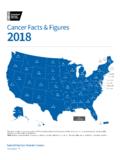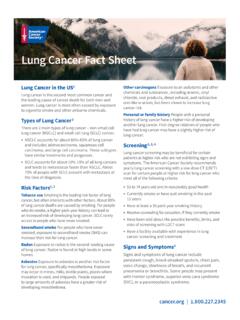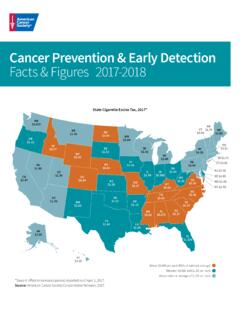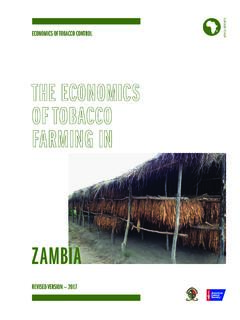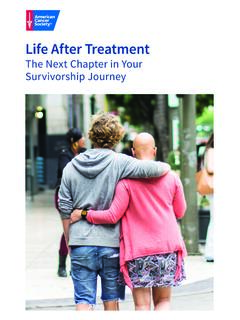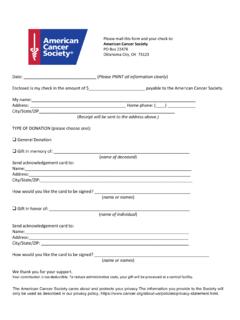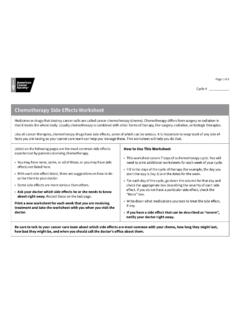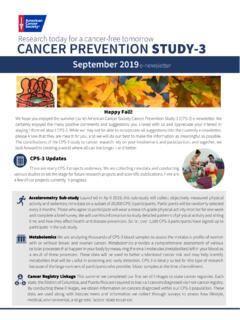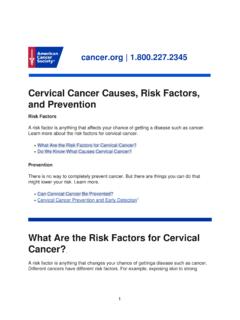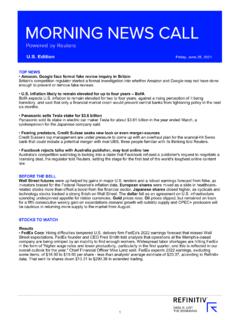Transcription of Nutrition for the Person with Cancer During Treatment
1 Nutrition for the Person With Cancer During TreatmentA Guide for Patients and Families21 What s InsideIntroduction 3 Benefits of good Nutrition During Cancer Treatment 5 Nutrients 6 Cancer and Cancer Treatment affect Nutrition 11 Before Treatment begins 12 Make plans now 13 Once Treatment starts 14 Eat well 14 Snack as needed 14 Tips to increase calories and protein 16 Don t forget about physical activity 18 Managing eating problems caused by surgery, radiation, and chemotherapy 19 Surgery 19 Radiation therapy 19 Chemotherapy 21 For people with weakened immune systems 22 Food-handling tips 22Do not cross-contaminate 23 Cook foods well 23 Grocery shopping 24 Dining out 242 How to cope with common eating problems 27 Appetite changes 27 Constipation 28 Diarrhea 31 Fatigue 33 Mouth dryness or thick saliva 34 Mouth sores 36 Nausea
2 39 Swallowing problems 41 Taste and smell changes 44 Weight gain 45 Nutrition after Treatment ends 46 Tips for healthy eating after Cancer 46To learn more 47 More American Cancer Society information 47 National organizations and websites* 47 Recipes to try 48 High-calorie, high-protein shake and drink recipes 48 Homemade soup recipes 50 Nutrition for the Person With Cancer During Treatment : A Guide for Patients and FamiliesNutrition is an important part of Cancer Treatment . Eating the right kinds of foods before, During , and after Treatment can help you feel better and stay stronger. Not everyone has Nutrition -related side effects, but this guide will help you address them if and when they come up. You don t have to read straight through all the information here. You can just read the sections you need and use what applies to you. 3 The information in this guide is not meant to replace the advice of a medical professional.
3 If you have any questions or concerns, you should talk to a doctor, nurse, or dietitian about your nutritional needs. A registered dietitian (RD) can be one of your best sources of information about your diet. If you re going to meet with a dietitian, be sure to write down your questions before your meeting so you won t forget anything. You can find more on Nutrition before, During , and after Cancer Treatment in our book called American Cancer Society Complete Guide to Nutrition for Cancer Survivors: Eating Well, Staying Well During and After Cancer . Call us at 1-800-227-2345 or visit our bookstore online at to find out about costs or to place an more general information or to find a registered dietitian, contact the Academy of Nutrition and Dietetics (see the To learn more section on page 47). 4 Benefits of good Nutrition During Cancer treatmentGood Nutrition is especially important if you have Cancer because both the illness and its treatments can change the way you eat.
4 Cancer and Cancer treatments can also affect the way your body tolerates certain foods and uses nutrient needs of people with Cancer vary from Person to Person . Your Cancer care team can help you identify your Nutrition goals and plan ways to help you meet them. Eating well while you re being treated for Cancer might help you: Feel better. Keep up your strength and energy. Maintain your weight and your body s store of nutrients. Better tolerate Treatment -related side effects. Lower your risk of infection. Heal and recover We need protein for growth, to repair body tissue, and to keep our immune systems healthy. When your body doesn t get enough protein, it might break down muscle for the fuel it needs. This makes it take longer to recover from illness and can lower resistance to infection. People with Cancer often need more protein than usual. After surgery, chemotherapy, or radiation therapy, extra protein is usually needed to heal tissues and help fight sources of protein include fish, poultry, lean red meat, eggs, low-fat dairy products, nuts and nut butters, dried beans, peas and lentils, and soy foods.
5 Fats Fats play an important role in Nutrition . Fats and oils are made of fatty acids and serve as a rich source of energy for the body. The body breaks down fats and uses them to store energy, insulate body tissues, and transport some types of vitamins through the blood. You may have heard that some fats are better for you than others. When considering the effects of fats on your heart and cholesterol level, choose monounsaturated and polyunsaturated fats more often than saturated fats or trans fats are found mainly in vegetable oils like olive, canola, and peanut oils. Polyunsaturated fats are found mainly in vegetable oils like safflower, sunflower, corn, and flaxseed. They are also the main fats found in seafood. 6 Saturated fats are mainly found in animal sources like meat and poultry, whole or reduced-fat milk, cheese, and butter. Some vegetable oils like coconut, palm kernel oil, and palm oil are saturated. Saturated fats can raise cholesterol and increase your risk for heart disease.
6 Trans-fatty acids are formed when vegetable oils are processed into solids, such as margarine or shortening. Sources of trans fats include snack foods and baked goods made with partially hydrogenated vegetable oil or vegetable shortening. Trans fats are also found naturally in some animal products, like dairy products. Avoid trans fats as much as you Carbohydrates are the body s major source of energy. Carbohydrates give the body the fuel it needs for physical activity and proper organ function. The best sources of carbohydrates fruits, vegetables, and whole grains also supply needed vitamins and minerals, fiber, and phytonutrients to the body s cells. (Phytonutrients are chemicals in plant-based foods that we don t need to live, but that might promote health.)Whole grains or foods made from them contain all the essential parts and naturally occurring nutrients of the entire grain seed. Whole grains are found in cereals, breads, and flours.
7 Some whole grains, such as quinoa, brown rice, or barley, can be used as side dishes or part of an entr e. When choosing a whole-grain product, look for the words whole grain, stone ground, whole ground, whole-wheat flour, whole-oat flour, or whole-rye flour. 7 Fiber is the part of plant foods that the body can t digest. There are 2 types of fiber. Insoluble fiber helps to move food waste out of the body quickly, and soluble fiber binds with water in the stool to help keep stool soft. Other sources of carbohydrates include bread, potatoes, rice, spaghetti, pasta, cereals, corn, peas, and beans. Sweets (desserts, candy, and drinks with sugar) can supply carbohydrates, but provide very little in the way of vitamins, minerals, or phytonutrients. Water All body cells need water to function. If you don t take in enough fluids or if you lose fluids through vomiting or diarrhea, you can become dehydrated (your body doesn t have as much fluid as it should).
8 You get water from the foods you eat, but a Person should also drink about eight 8-ounce glasses of liquid each day to be sure that all the body cells get the fluid they need. Keep in mind that all liquids (soups, milk, even ice cream and gelatin) count toward your fluid and minerals The body needs small amounts of vitamins and minerals to help it function properly. Most are found naturally in foods. They are also sold as supplements in pill and liquid form. They help the body use the energy (calories) found in foods. A Person who eats a balanced diet with enough calories and protein usually gets plenty of vitamins and minerals. But it can be hard to eat a balanced diet when you re being treated for Cancer , especially if you have Treatment side effects that last for a long time. In this case, your doctor or dietitian may suggest a daily multivitamin and mineral supplement. 8 If you re thinking of taking a vitamin or supplement, be sure to discuss this with your doctor first.
9 These substances can be harmful, especially when taken in large doses. In fact, large doses of some vitamins and minerals may make chemotherapy and radiation therapy less effective. Antioxidants Antioxidants include vitamins A, C, and E; selenium and zinc; and some enzymes that absorb and attach to free radicals, preventing them from attacking normal you want to take in more antioxidants, health experts recommend eating a variety of fruits and vegetables, which are good sources of antioxidants. Taking large doses of antioxidant supplements or vitamin-enhanced foods or liquids is usually not recommended while getting chemo or radiation therapy. Talk with your doctor to find out the best time to take antioxidant Phytonutrients or phytochemicals are plant compounds like carotenoids, lycopene, resveratrol, and phytosterols that are thought to have health-protecting qualities. They re found in plants such as fruits and vegetables, or things made from plants, like tofu or tea.
10 Phytochemicals are best taken in by eating the foods that contain them rather than taking supplements or pills. Herbs Herbs have been used to treat disease for hundreds of years, with mixed results. Today, herbs are found in many products, like pills, liquid extracts, teas, and ointments. Many of these products are harmless and safe to use, but others can cause 9harmful side effects. Some may even interfere with proven Cancer treatments, including chemo, radiation therapy, and recovery from surgery. If you re interested in using products containing herbs, talk about it with your oncologist or nurse considerations Many people believe that if they find a pill or supplement in stores, it s safe and it works. The Food and Drug Administration (FDA) has rules to help ensure that supplements contain what their labels claim they do, but the supplement s safety and its effects on the body are not addressed by any FDA rules. The FDA does not make manufacturers of these products print possible side effects on their labels.
